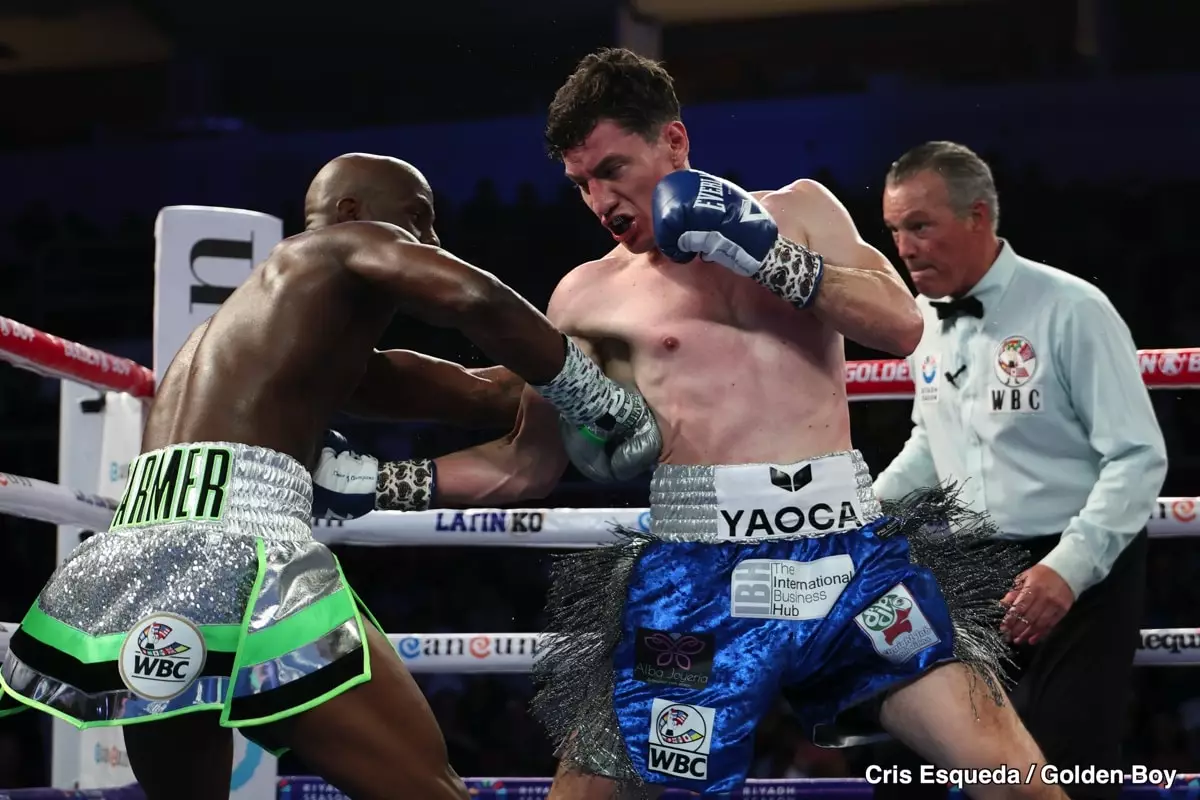In a boxing match that has sparked intense debate among fans and pundits alike, Tevin Farmer’s efforts to clinch his way through a rematch with William Zepeda resulted in a majority decision defeat that many observers feel could have been avoided had he adopted a more offensive approach. At Poliforum Benito Juárez in Cancún, Mexico, Farmer’s strategy seemed more about survival than about seizing opportunities, which is detrimental when facing a fighter of Zepeda’s caliber. With remarkable precision, Zepeda demonstrated why he is the WBC interim lightweight champion, proving his mettle not just through aggressive striking but through seizing the momentum of the fight.
Farmer’s approach—relying heavily on clinching—might initially appear to be a sound defensive tactic, yet it quickly devolved into apparent desperation. By focusing on holding rather than striking, he allowed Zepeda, with an impressive record of 33-0 (27 KOs), to dictate the pace of the match, forcing him into a corner both literally and figuratively. Throughout most of the contest, Farmer’s reliance on clinches felt more like a crutch than a calculated strategy. He may have believed that tying Zepeda up would thwart his offensive assault, but in reality, it rendered him far less effective, delivering only occasional potshots that failed to leave a lasting impression on the judges.
Judging the Judging: A Question of Fairness
As the match progressed, the disparity in their fighting styles became notably apparent. Zepeda’s relentless energy and willingness to throw punches contrasted sharply with Farmer’s clinch-heavy approach. The judges’ scorecards reflected this dynamic, with Zepeda walking away with the majority decision triumph—114-114, 116-112, and 115-113. While Farmer may have felt hard done by the outcome, it is crucial to note that judges often reward activity and effective aggression over a passive defense.
Farmer’s claims of being “robbed” seem misplaced; instead, the fight itself resembled a test matching a more traditional striker against a defensive specialist who mistakenly prioritized holding over hitting. To the casual viewer, this fight may have felt like a clear win for Zepeda. However, there are further implications regarding how referees officiate such bouts. If the clinching is excessive, as many argued it was in Farmer’s case, it begs the question: should referees penalize the fighter who employs it excessively? A more assertive officiating strategy could lead to more engaging fights and could potentially alter the outcome if fighters realize there’s a financial or physical penalty attached to negative tactics.
Analyzing the Championship Rounds
Interestingly enough, Farmer did have moments of success in the later rounds of the match. As Zepeda began to tire, Farmer showed bursts of unrecognizable brilliance by letting his hands go and landing some potent punches. In round twelve, he even appeared to drop Zepeda, though the referee failed to make the recognition—an error that could haunt Farmer for some time. In the aftermath, it becomes essential to contemplate what these moments say about Farmer’s capabilities; they underscore the athlete’s potential to thrive when he breaks away from his clinch-centric approach.
Yet, these moments, albeit breathtaking, were not enough to redeem the broader tactical issues he displayed throughout the match. As Zepeda managed to maintain dominance for the majority of the fight, Farmer’s glimpses of offensive prowess emerged too late to turn the tide decisively in his favor. Ultimately, there appears to be a fundamental mismatch in their styles, a narrative arc that many boxing fans feel points toward Farmer needing to adapt his game plan rather than continually relying on clinching to survive.
Moving Forward: The Impending Battle of Styles
While a third fight between Zepeda and Farmer may seem tempting to some, it is essential to recognize that the dynamics of their rivalry could pose risks that outweigh the benefits for Zepeda. The boxing world is filled with emerging talent, and Zepeda’s focus should shift toward fresh matchups that challenge his abilities and expand his career prospects. Meanwhile, Farmer could take this moment to reassess his fighting style, possibly seeking bouts against varied opponents such as Andy Cruz, who could compel him to employ a more aggressive and engaging strategy.
In sports, adaptability separates the average competitors from the future champions. The lessons learned from Farmer’s recent performance should serve as a stern reminder that winning in the ring requires more than just survival tactics; it demands calculated risk-taking and a willingness to change. As we continue to reflect on this match, it is clear that the narrative of Farmer and Zepeda is far from over, yet it certainly calls for more depth and strategic engagement that can only come from fighting outside the safe confines of clinching.

